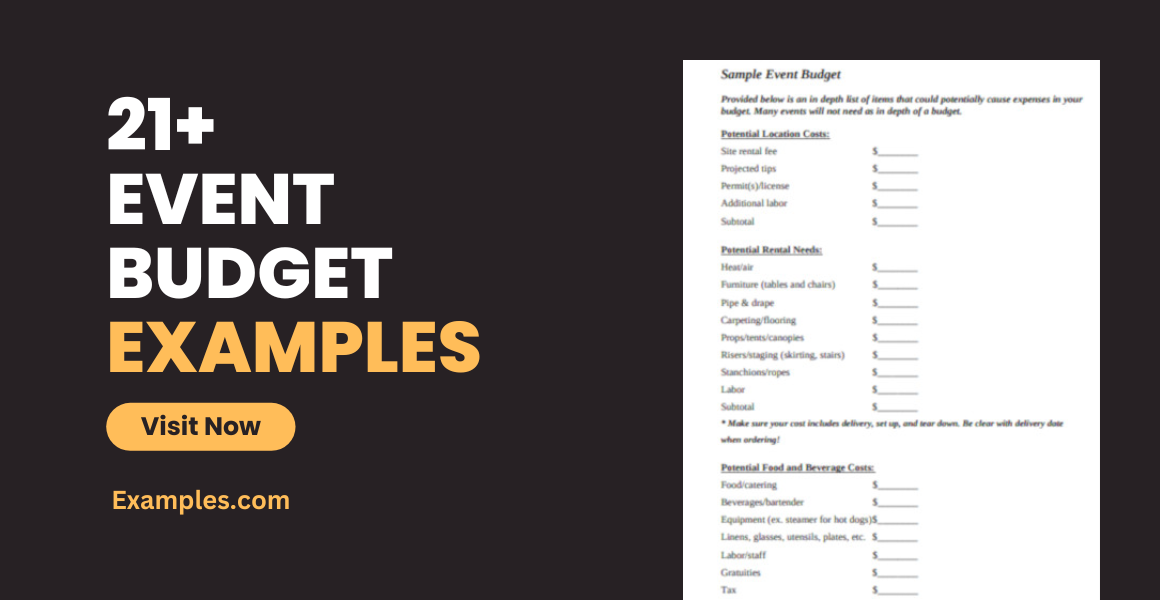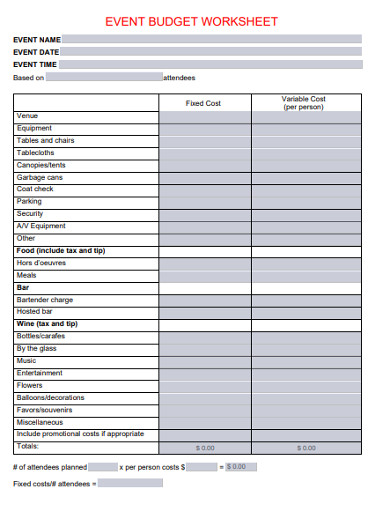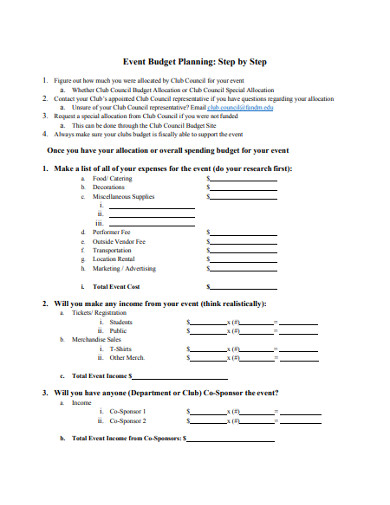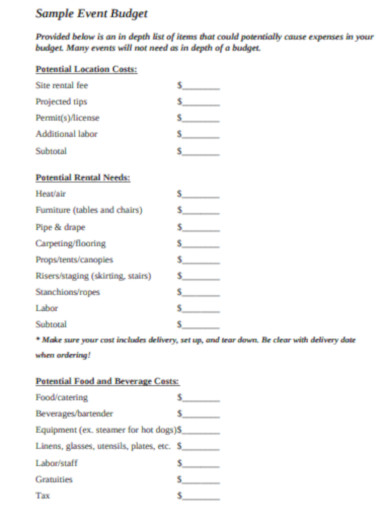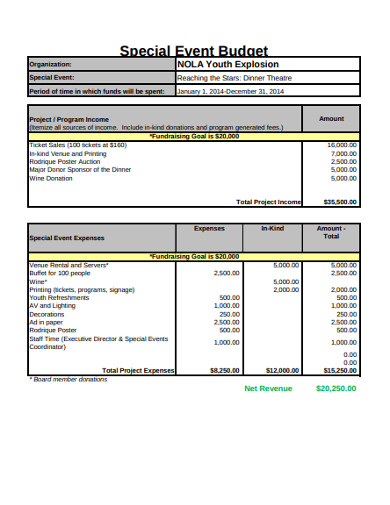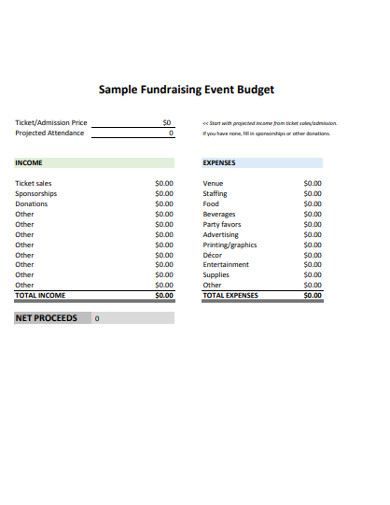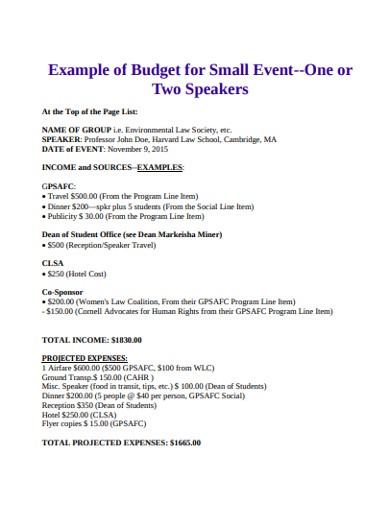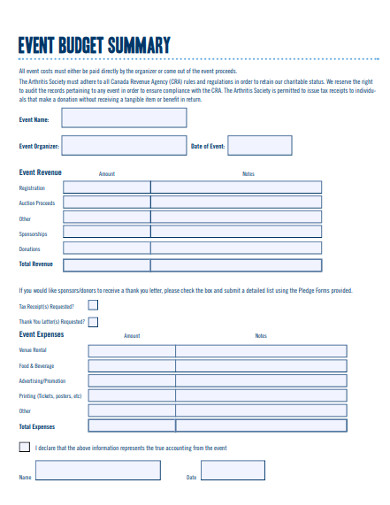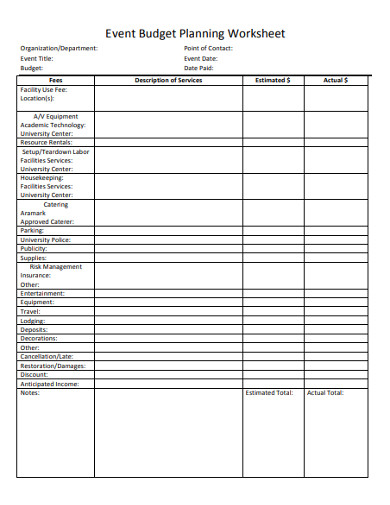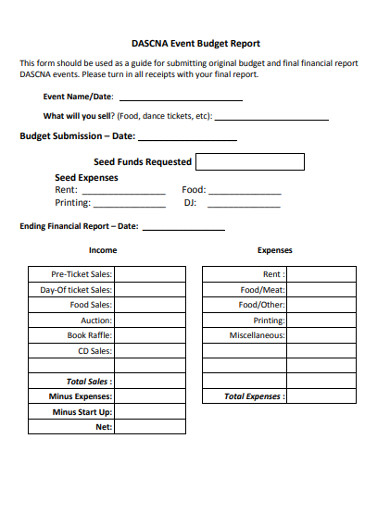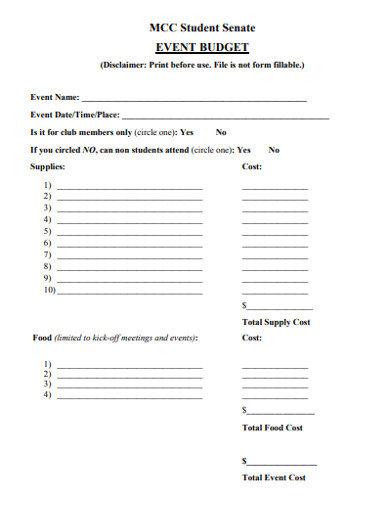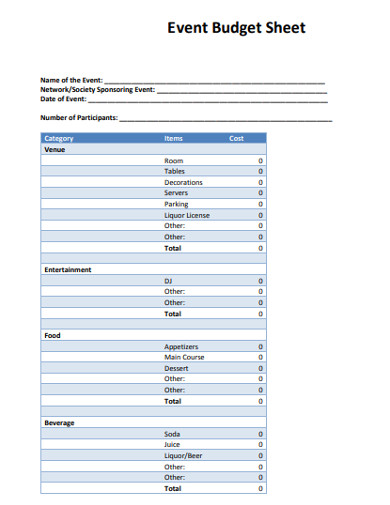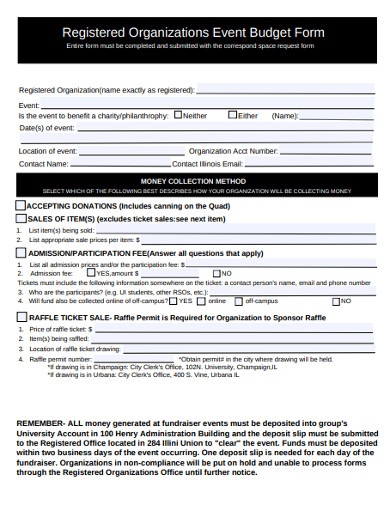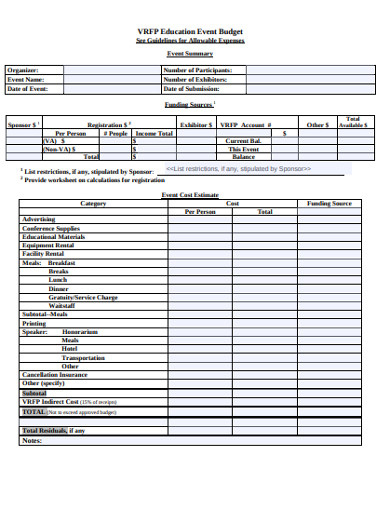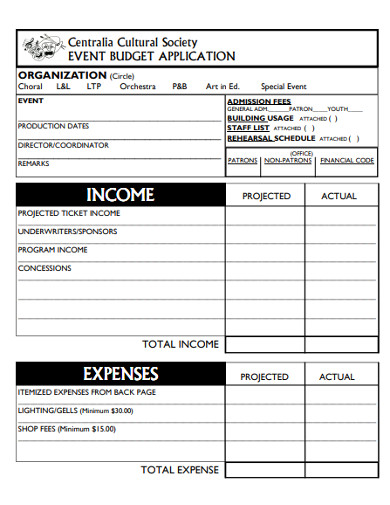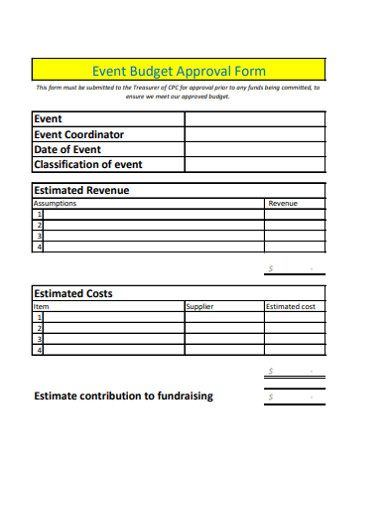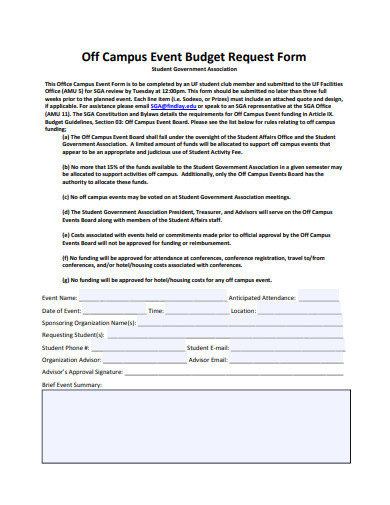21+ Event Budget Examples to Download
Behind the sparkle of lights, the mouthwatering entrée’s, and captivating music is a grueling story of planning an event budget. All that glamorous glow of a special occasion is rooted in months of planning the right estimate and fitting all pieces together within a predetermined budget figure. A good budget planning always results in something wonderful and memorable. It helps you identify the financial details of an event and decide what needs to be on board and what’s unnecessary. It’s also an important tool to help make changes in the plan when the situation demands it. Go through our event budget examples below and learn how to plan a budget for your unforgettable celebrations carefully.
What is an Event Budget?
Event budgets are the expenditure list of everything that concerns a specific event. It contains actual amounts, estimates, and the items or services that need to be availed. Nothing happens with the event preparation unless the budget is established, discussed, and approved.
What is the Best Example of Event Budget?
The best example of an event budget is a detailed document that categorizes and lists all expected expenses and income sources for an event.
Best Example of an Event Budget:
An event budget is a detailed outline of all expected revenues and expenses associated with organizing an event. It serves as a financial blueprint, guiding event planners in managing costs effectively. Here’s a detailed example of what a comprehensive event budget might include:
Revenue Sources
- Ticket Sales: Projected income from selling tickets, including VIP or special access tickets.
- Sponsorship: Revenue generated from event sponsors.
- Merchandise Sales: Income from selling merchandise related to the event.
- Donations: Expected donations, if applicable.
Fixed Costs
- Venue Rental: Cost for renting the event location.
- Equipment Rental: Expenses for a-visual equipment, stages, lighting, etc.
- Insurance: Insurance costs to cover various liabilities.
- Licenses and Permits: Any required permits or licenses fees.
Variable Costs
- Catering: Food and beverage costs, including service staff.
- Entertainment: Fees for performers, speakers, or entertainers.
- Decorations: Costs for decor elements like flowers, banners, and thematic decorations.
- Marketing and Advertising: Expenses for promotional materials, digital marketing, and advertising.
- Transportation and Accommodation: For guests, speakers, or performers, if applicable.
- Event Staff: Costs for temporary staff like security, coordinators, and technicians.
Contingency Fund
- Emergency Reserve: A set percentage of the total budget (usually 10-15%) reserved for unforeseen expenses.
Example Scenario:
Let’s consider a corporate conference with a budget of $100,000. Here’s how the budget might be allocated:
Revenue Sources:
Ticket Sales: $60,000
Sponsorship: $30,000
Merchandise: $5,000
Donations: $5,000
Fixed Costs:
Venue Rental: $20,000
Equipment Rental: $10,000
Insurance: $2,000
Licenses/Permits: $1,000
Variable Costs:
Catering: $15,000
Entertainment: $10,000
Decorations: $5,000
Marketing/Advertising: $10,000
Transportation/Accommodation: $5,000
Event Staff: $7,000
Contingency Fund:
Emergency Reserve: $10,000
Income sources might include ticket sales, sponsorships, and vendor fees. The goal is to create a comprehensive budget that accurately forecasts both expenses and revenues, ensuring the financial success of the event.
21+ Event Budget Examples
1. Event Budget Template Example
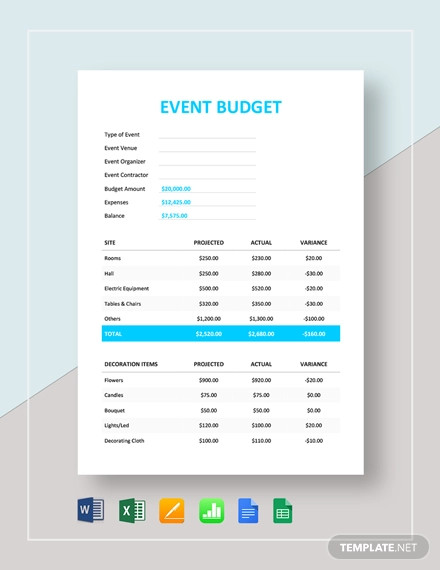
2. Corporate Conference Event Budget Example
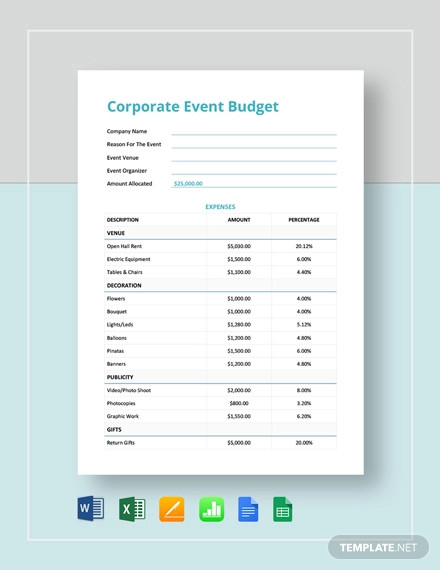
3. Nonprofit Event Budget Example Template
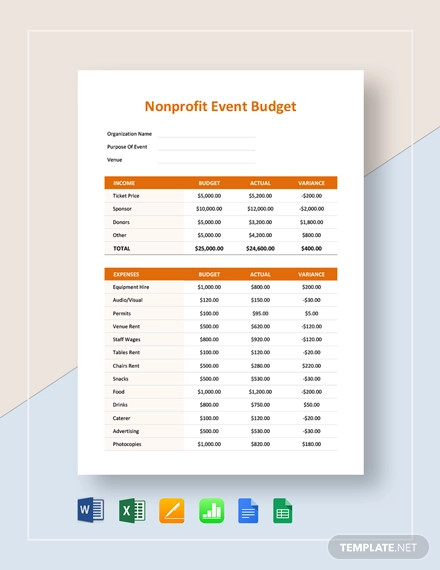
4. Example of Church Event Budget Template
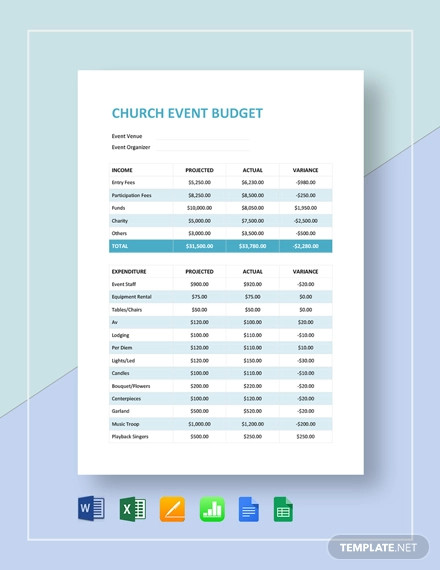
5. Event Budget Proposal Sample
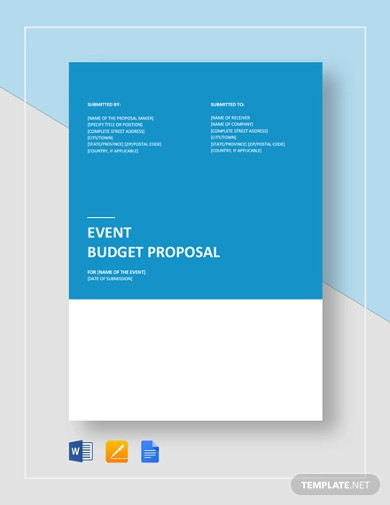
6. Event Budget Worksheet Sample
7. Event Planning Budget Sample
8. Sample Event Budget Income Estimate
9. Special Event Budget Sample in PDF
10. Fundraising Food Event Budget
11. Budget Proposal Sample for Event
12. Virtual Event Budget Summary
13. Event Budget Expense Tracker Sample
14. Event Planner Budget Worksheet
15. Event Budget Report Example
16. Student Birthday Party Event Budget Sample
17. Event Budget Spreadsheet Excel
18. Wedding Event Budget Form
19. Education Event Budget Example
20. Event Project Budget Application Form
21. Event Budget Approval Form Template
22. Off Campus Event Budget Request Form
How to Plan a Good Event Budget
Special private moments and cultural celebrations are not only those that demand attention and expenses. Even marketers have turned to events planning as well as a promotional strategy. According to The Bizzabo Blogs statistics, 41% of marketers believe that events are among the most effective marketing strategy. According to Medium, event marketing is valuable because it’s efficient in getting leads and promoting brand awareness.
Event budgeting is every bit as important as the occasion itself. Read through the guideline below and learn how you can make an event budget:
1. Start With a Bracket Estimate
Unless you’re willing to blindly reach into your pocket and pay whatever the event price might be, it’s best to sit down and decide on an event cost estimate. If you don’t have the exact figures in mind, establish a bracket instead. Your budget for a party or a special occasion will determine if it’s going to be a simple get-together or an extravagant celebration. If you’re hiring event organizers, this will help them draw the plan because the cost limit allows them to consider what to include and what to omit to create an extraordinary day that sits within the established amount.
2. List Down Every Item of Financial Concern
Take out your event planner and begin by making a list of all things that you might need to pay. Depending on the nature of the occasion, that might be everything. If you’re thinking of a simple office party for employees, you might only be looking at food and a few decorations to bring color to your meeting room. That won’t be complicated. However, you might be dealing with large galas, festivals, conferences, and weddings. This means tons of materials and endless vendor dials. To help you sort out what you might need to be spending on, classify all your expenses into large categories and list down corresponding items below them. As an example, if you list down “Entertainment,” that could include talent fees for performers and rental activity equipment.
3. Allocate
Now that you have a budget and a long list of items to spend it on, it’s time to break down the amount and allocate them. Do this effectively by doing approaching different vendors and other sources and finding out how much they charge for a certain item. It also depends on how much you’re willing to spend on it. Do you want expensive flower decors and a slightly lesser budget for stationeries? Would you make the food homemade or get it all done by a caterer? Do you resort to email or get a dozen of party invitations done? Questions like this will help you chop down the budget and allot it to different event concerns on your budget worksheet.
4. Be Ready for Adjustments
Don’t think that just because you have laid everything out on a neat event budget spreadsheet, it’s already final. Along the way, you’ll have to compromise and alter some details. You might even have to override the budget proposal completely for either a cheaper celebration or a much bigger event. This is why you should never regard to your event budget as the final result but rather a flexible structure.
FAQ’s
How much does an event planner get paid in the United States?
According to Glassdoor, an event planner gets paid $50,000 per year on average.
What are the three types of expenses?
The three types of expenses are fixed, periodic, and variable.
What is an event checklist?
An event checklist is a list of things that a planner must accomplish to create a successful event. It can start months before the actual event schedule until the occasion’s post-event activities.
Event planning is never easy, but when done right, it would go down in history as something remembering forever. An efficient budget planning will offer you the result that you want your event to have. It goes through every detail and is at the core of every decision making during the occasion’s preparation period. If you’re in need of an event budget, we have tons of them. Look through our event budget examples, and you won’t fail to see something that perfectly fits your purpose. Download now!


